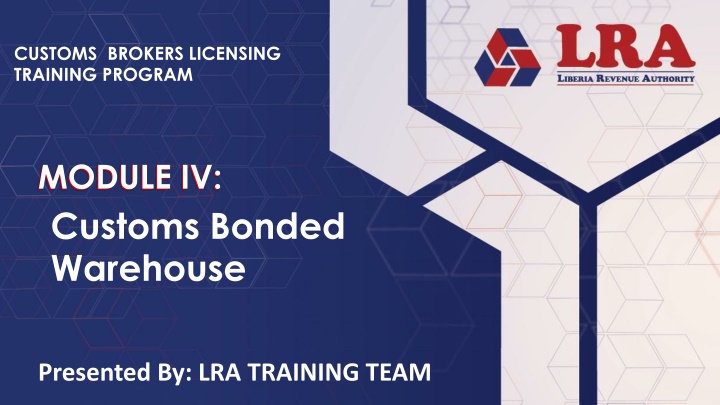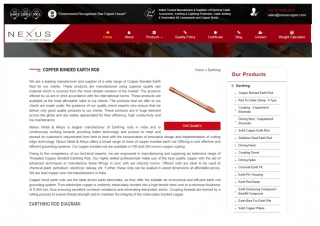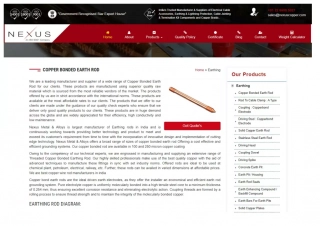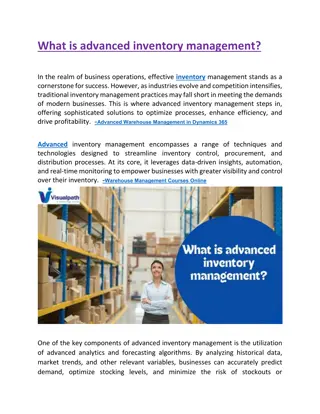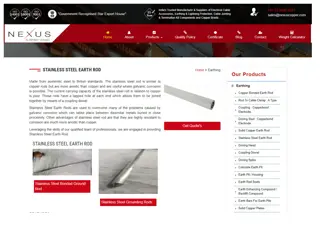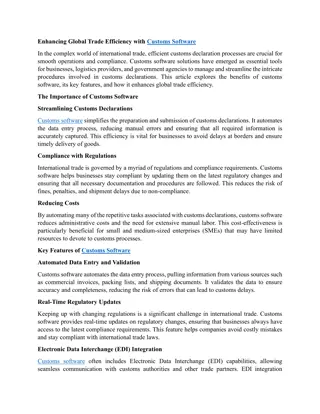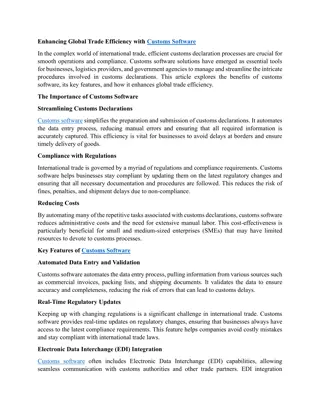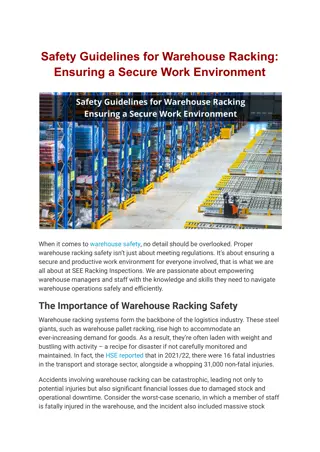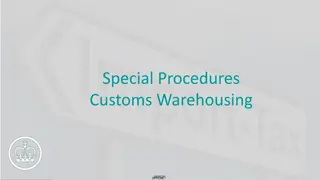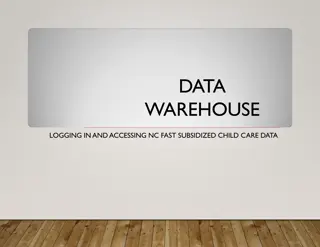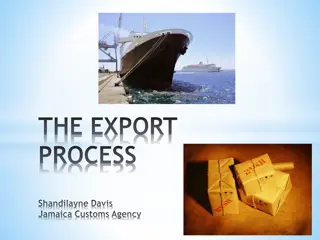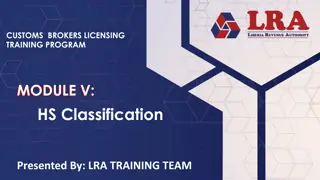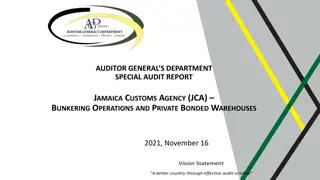Customs Bonded Warehouse Establishment Guidelines
This module covers the legal framework and process for establishing a customs bonded warehouse, including managing operations and penalties for non-compliance. Learn about the regulations governing bonded warehousing under the Revised Kyoto Convention and Liberia's Revenue Code. Discover the key steps for setting up a bonded warehouse and understand the approval process outlined by the Minister.
Download Presentation

Please find below an Image/Link to download the presentation.
The content on the website is provided AS IS for your information and personal use only. It may not be sold, licensed, or shared on other websites without obtaining consent from the author.If you encounter any issues during the download, it is possible that the publisher has removed the file from their server.
You are allowed to download the files provided on this website for personal or commercial use, subject to the condition that they are used lawfully. All files are the property of their respective owners.
The content on the website is provided AS IS for your information and personal use only. It may not be sold, licensed, or shared on other websites without obtaining consent from the author.
E N D
Presentation Transcript
CUSTOMS BROKERS LICENSING TRAINING PROGRAM MODULE IV: Customs Bonded Warehouse Presented By: LRA TRAINING TEAM
Content Introduction The legal framework for Establishing a Customs Bonded Warehouse The process of Establishing a Customs Bonded Warehouse Managing a Bonded Warehouse Penalty for failure to ahead to the Revenue Law
Introduction This module seeks to introduce the procedure on Customs Bonded Warehouse and the legal basis for warehouse operation. Customs warehousing orbonded warehousing refers to the Customs procedure in which imported goods are stored under Customs control in a designated place (approved Customs warehouse) with payment of import duties and taxes suspended pending the withdrawal of goods from the warehouse. Bonded warehousing is one of many regimes administered by the LRA through Customs. It is a concept advanced in Chapter One of Specific Annex D of the Revised Kyoto Convention (RKC) of the World Customs Organization (WCO).Slide Text
Part I: The legal framework for Warehousing Part I: The legal framework for Warehousing The legal basis for customs bonded warehouse is found in : 1. The World Customs Organization(WCO) Revised Kyoto Convention(RKC)- Annex D; Standards 1-16. 2. Section 14151 of the Revenue Code of Liberia, Purposes for which Imported Goods may be entered: for consumption, if so eligible; or for warehousing; or for transit or transshipment; or where permitted under the customs laws, for the temporary importation with a view to their re-exportation; 3. Section 14158. Duty Not Payable on Goods Entered for Warehousing Any goods which are on their importation permitted to be entered for warehousing shall be allowed to be warehoused without payment of duty .
Part II: Establishing a Customs Bonded Warehouse Part II: Establishing a Customs Bonded Warehouse Section 14185. Approval of Warehouses (a) The Minister may, upon application of the occupier thereof, approve, for such periods and subject to such conditions and restrictions as he sees fit to impose, places of security for the deposit of Any goods chargeable with a duty of customs, without payment of that duty; Imported goods intended for re-exportation or shipment as stores, being goods not eligible for consumption in Liberia; and Goods permitted under the customs laws to be warehoused on payment of drawback.
Establishing a Customs Bonded Warehouse Establishing a Customs Bonded Warehouse cont cont (b)Any place of security so approved shall in this Code be referred to as a warehouse . (c) The Minister may in his approval specify (1) the class or description of goods which may be deposited in any particular warehouse; and (2) the part of any warehouse in which any class or description of goods may be deposited. (d) The Minister may at any time, for reasonable cause, revoke or vary the terms of approval of a warehouse. (e) The warehouse proprietor shall not, without the previous consent of the Minister, make any addition or alteration of the warehouse. (I ) Notwithstanding any other provisions of the customs laws, the proprietor of a warehouse shall, in respect of any goods deposited therein, be responsible to the owner of the goods for the safe custody thereof and to the Government for the duty chargeable thereon, until those goods have lawfully been withdrawn from the warehouse. Slide Text
Establishing a Customs Bonded Warehouse Establishing a Customs Bonded Warehouse cont cont Section 14186. Bond to be given Bond shall be given in amount of 150 percent of the assessed customs duty due Government and manner as the Minister shall prescribe and determine: (1) By the proprietor of any warehouse in respect of goods deposited and kept therein until they are lawfully withdrawn from the warehouse; (2) By any person making entry of goods for warehousing or re-warehousing; and (3) Except as otherwise allowed by the Minister, by any person withdrawing goods from a warehouse other than for consumption on payment of the full duty due thereon.
Type of warehouses Type of warehouses- - There are two types of warehouses: The General Ware house and the private warehouse. Section 14185: (g.) A warehouse may be approved as either - (1) a private warehouse for the deposit of goods belonging exclusively to the proprietor of that warehouse; or (2) a general warehouse for the use of importers and traders generally. (h) The proprietor of a general warehouse shall not, without reasonable cause being shown to the satisfaction of the Minister, refuse to accept the deposit in that warehouse of any goods eligible for deposit therein.
Part III: Managing a Customs Bonded Warehouse Part III: Managing a Customs Bonded Warehouse Section 14187. Appointment of Officers to Supervise Warehouses; Compensation Payable by Warehouse Proprietor; Provision of Accommodation. (a) Appointment and Compensation. (1) The Minister shall appoint an officer or officers to supervise each warehouse, to take any necessary account of goods received, or in storage, or being manipulated, or in the course of withdrawal from warehouse, and generally to ensure compliance with the provisions of this Code relating to the warehousing of goods. (2) The proprietor of any warehouse shall reimburse the Government at rates to be determined by the Minister, for the cost of providing the supervision by officers of that warehouse. The warehouse proprietor shall provide for the use of officers appointed to supervise the warehouse, free of expense to the Government, suitable office accommodation and toilet facilities with the necessary furniture, lighting, air conditioning, heating and cleaning. Slide Text (b) Accommodation for Warehouse Officers.
Managing a Customs Bonded Warehouse Managing a Customs Bonded Warehouse Cont Cont Section 14188. Import Procedure (a) Entry of Goods for Warehousing. Before any imported goods are warehoused the importer shall make entry thereof in accordance with the provisions of this Code. (b) Goods to be treated in Original Containers or Lots. Except as otherwise allowed by the Minister, goods shall be deposited and kept in warehouse in the containers or lots in which they were first entered for warehousing.
Managing a Customs Bonded Warehouse Managing a Customs Bonded Warehouse Cont Cont c) Marking of Goods In Warehouse. The warehouse proprietor shall mark the containers or lots of warehoused goods in such manner as the proper officer shall direct and shall, subject to any further directions, keep them so marked while they are in the warehouse. (d) Storage of Goods in Warehouse. The warehouse proprietor shall stow every container or lot of warehoused goods so as to facilitate easy access thereto and identification thereof.
Managing a Customs Bonded Warehouse Managing a Customs Bonded Warehouse Cont Cont Section 14190. Inspection, Display and Sampling of Warehoused Goods Subject to such conditions and restrictions as the Minister sees fit to impose, and without prejudice to any reasonable conditions imposed by the warehouse proprietor, the owner of any warehoused goods may (1) inspect the goods and their containers and prevent loss therefrom; (2) display goods for sale; and (3) take samples from the goods.
Managing a Customs Bonded Warehouse Managing a Customs Bonded Warehouse Cont Cont Section 14191. Manipulation of Warehoused Goods Subject to such conditions and restrictions as the Minister sees fit to impose and with the permission of the proper officer, the warehouse proprietor or the owner of any goods may separate, pack or repack the goods or perform any other operation thereon necessary in connection with their preservation, sale, exportation or other approved disposal and any such permitted operation as referred to in this Code as manipulation . Provided that such manipulation shall not, except where otherwise allowed by the Minister, involve any process of manufacture or assembly of goods in warehouse.
Managing a Customs Bonded Warehouse Managing a Customs Bonded Warehouse Cont Cont Section 14192. Deficiency in Warehoused Goods a) If, at any time after goods have been warehoused and before they are lawfully withdrawn there from in accordance with the provisions of this Code, the goods are found to be missing or deficient and it is not shown to the satisfaction of the Minister that their absence or deficiency is due to natural wastage or other legitimate cause, then, without prejudice to any other provisions of the customs laws, the Minister may require the warehouse proprietor or the owner of the goods to pay immediately the duty due on the missing goods or the deficiency. b) If on the written demand of the proper officer for the payment of any duty due under the foregoing paragraph, the warehouse proprietor or owner of the goods refuses to pay the sum so demanded he shall, in addition, be liable to a penalty of double that sum. c) Where any goods have been lawfully removed from warehouse without payment of duty for transportation to another warehouse or some other place, the provisions of this Section shall apply to the goods as if they were still in warehouse; Provided that in such a case, any duty due to be paid under the provisions of Paragraph (a) of this Section shall be recoverable only from the owner of the goods or from any other person who has given bond to secure their withdrawal from warehouse for the transportation as aforesaid.
Cont Managing a Customs Bonded Warehouse Managing a Customs Bonded Warehouse Cont Section 14193. Time Allowed for Goods to Remain in Warehouse a) Except as the Minister shall otherwise allow, no goods shall remain in warehouse for longer than two years from the date of their first entry for warehousing; Provided that, except in the case of goods warehoused in the Freeport of Monrovia, the extension of time granted by the Minister under the provisions of this Section shall not extend more than four years from the date of first entry of goods for warehousing. b) If any goods which have not been duly cleared for withdrawal remain in warehouse beyond the time allowed in paragraph (a) above, the proper officer may cause the goods to be removed to a Government warehouse at the risk and expense of the warehouse proprietor or importer or owner of the goods. c) Where goods of which entry for consumption has been made and on which the full duty chargeable has been paid remain in warehouse beyond the time allowed in paragraph (a) above,
Cont Managing a Customs Bonded Warehouse Managing a Customs Bonded Warehouse Cont Section 14199. Re-warehousing of Warehoused Goods Where any goods are brought to a warehouse for re-warehousing after transportation from another warehouse, the importer or owner of the goods shall make entry thereof in such form and manner and containing such particulars as the Minister shall prescribe but otherwise the provisions of this Code relating to warehouse goods shall apply to such goods which have been re-warehoused. Section 14200. Refund of Duty Paid on Warehoused Goods Subject to such conditions as the Minister may prescribe, where any goods on which duty has been paid and which have remained under continuous customs supervision, in a warehouse are withdrawn for exportation or shipment for use as stores, any duty so paid thereon may be refunded.
Cont Managing a Customs Bonded Warehouse Managing a Customs Bonded Warehouse Cont Section 14201. Provision for Destruction of Warehoused Goods Where, with the permission of the Minister and subject to such conditions and restrictions as he sees fit to impose, any goods in warehouse are allowed to be destroyed, any duty paid or payable on those goods may be repaid or remitted. Section 14202. Restrictions on Abatements and Refunds Notwithstanding any other provisions of this Code, where any goods remain in a warehouse beyond the time allowed under the provisions of this Code no abatement or refund of duty shall be allowed in respect of any loss, destruction or damage suffered by those goods.
Cont Managing a Customs Bonded Warehouse Managing a Customs Bonded Warehouse Cont Section 14203. Procedure on Warehouse Ceasing to be approved (a) If the Minister intends to revoke or not to renew his approval of a warehouse he shall, not later than three months before the date when the revocation is due to take effect or the approval is to expire, give notice to this intention, specifying therein the said date. (b) The said notice shall be given in writing and shall be deemed to have been served on all persons interested in any goods deposited in that warehouse, or permitted to be deposited therein between the date of giving the notice and the date specified therein, if addressed to the proprietor or, and left at, the warehouse. (c) If after the date specified in the said notice, or such later date as the Minister may in any case allow, any goods not duty cleared remain in the warehouse, the proper officer may cause the goods to be removed to a Government warehouse at the risk and expense of the warehouse proprietor or importer or owner of the goods.
Part IV : Penalty for failure to ahead the Law Part IV : Penalty for failure to ahead the Law Section 14185 (f) If any person contravenes or fails to comply with the provisions of any approval granted by the Minister he shall be liable to a penalty of $200,000.00 and any goods in respect of which the offence is committed shall be liable to forfeiture. Section 14189. Production of Warehoused Goods to an Officer The warehouse proprietor shall produce to any officer on request any goods deposited therein which have not been lawfully withdrawn therefrom and, notwithstanding any other provisions of this Code, he shall be liable to a penalty of $20,000.00 for every container or lot which he fails to produce.
